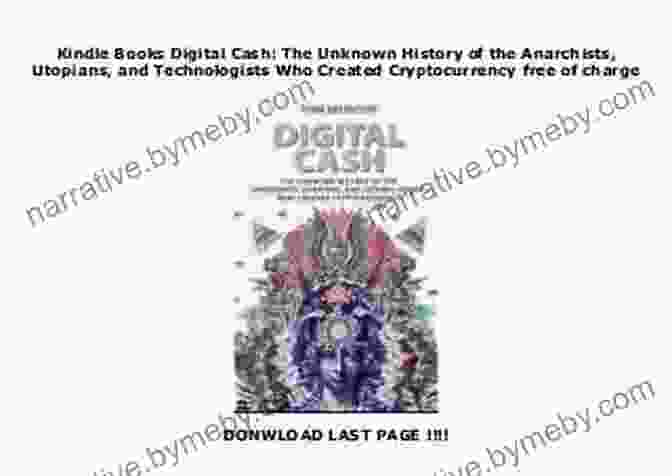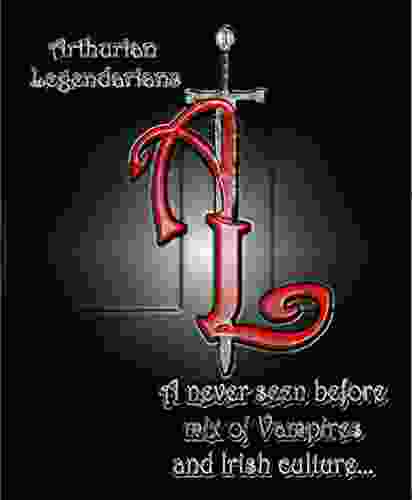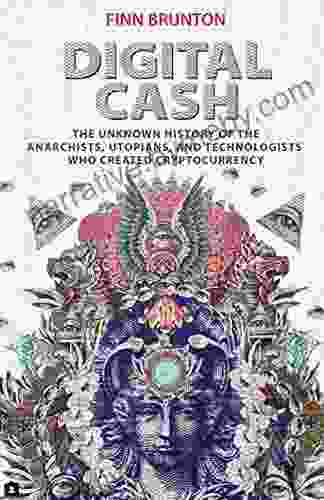The Unknown History of the Anarchists, Utopians, and Technologists Who Created the Internet

The Internet: A Product of Anarchy, Utopia, and Technology
In the realm of technology, the Internet stands as a colossal achievement, connecting billions of people across the globe. Yet, its origins lie not solely in the realm of scientific innovation, but also in the intertwined threads of anarchism, utopianism, and technological vision. "The Unknown History of the Anarchists, Utopians, and Technologists Who Created the Internet" unveils this fascinating narrative, delving into the lives and ideas of the extraordinary individuals who shaped the digital landscape we inhabit today.
4 out of 5
| Language | : | English |
| Text-to-Speech | : | Enabled |
| Enhanced typesetting | : | Enabled |
| Word Wise | : | Enabled |
| File size | : | 3459 KB |
| Screen Reader | : | Supported |
| Print length | : | 267 pages |

The Roots of Anarchy and Utopia
The seeds of the Internet were sown amidst the intellectual ferment of the 19th century. Anarchists, longing for a society free from centralized authority, sought to create alternative communities based on principles of autonomy and cooperation. Utopians, driven by a vision of a perfect society, envisioned technological advancements that would liberate humanity from toil and oppression.
These ideas found fertile ground in the writings of thinkers such as Pierre-Joseph Proudhon, Mikhail Bakunin, and Charles Fourier. Proudhon advocated for a decentralized society where individuals would freely exchange goods and services without the mediation of the state. Bakunin believed in the need for violent revolution to overthrow the existing Free Download and create a society based on equality and freedom. Fourier proposed the establishment of self-sufficient communities called "phalanxes," where individuals would work together harmoniously.
The Rise of Technological Visionaries
As the 20th century dawned, technological advancements began to converge with the anarchist and utopian ideals. Scientists and engineers, inspired by the possibilities of electricity and telecommunications, envisioned a future where technology would empower individuals and foster a more just society.
Among these visionaries were Vannevar Bush, a scientist and engineer who developed the concept of the Memex, a personal information retrieval system that foreshadowed the modern Internet. Norbert Wiener, a cyberneticist, coined the term "cybernetics" and explored the potential of machines to communicate and learn. And Claude Shannon, a mathematician, laid the foundations of information theory, which would become essential for the development of digital networks.
The Convergence of Ideas
In the post-World War II era, the convergence of anarchist, utopian, and technological ideas gained momentum. The rise of the counterculture movement in the 1960s and 1970s provided a fertile environment for these ideas to flourish.
Within this milieu, a new generation of thinkers and activists emerged, driven by a desire to create a more democratic and egalitarian society. They saw technology as a tool that could be harnessed to challenge authority, foster collaboration, and distribute knowledge more equitably.
The Birth of the Internet
The final chapter in this remarkable story unfolded in the late 1970s and early 1980s, as scientists and engineers at the United States Department of Defense began developing a network that would eventually become the Internet. Initially conceived as a way to connect military and research institutions, the network soon attracted the attention of academics, hackers, and activists.
These early adopters recognized the potential of the Internet to transcend geographic boundaries and facilitate the free exchange of ideas. They formed online communities, shared information, and developed tools that would shape the future of the network. Among these pioneers were individuals such as Tim Berners-Lee, who invented the World Wide Web, and Richard Stallman, who founded the Free Software Foundation.
The Legacy of Anarchism, Utopia, and Technology
Today, the Internet has become an indispensable part of our lives. It has transformed the way we communicate, learn, work, and access information. Yet, few are aware of the anarchist, utopian, and technological roots that shaped its development.
The story of the Internet is a testament to the power of ideas. It is a reminder that even the most transformative technologies are shaped by the social and political contexts in which they are created. And it is a celebration of the visionaries who dared to imagine a future where technology would empower individuals and create a more just and equitable society.
As we navigate the complexities of the digital age, it is essential to remember the origins of the Internet. By understanding the anarchist, utopian, and technological influences that gave birth to this powerful tool, we can better shape its future and ensure that it serves the interests of all humanity.
4 out of 5
| Language | : | English |
| Text-to-Speech | : | Enabled |
| Enhanced typesetting | : | Enabled |
| Word Wise | : | Enabled |
| File size | : | 3459 KB |
| Screen Reader | : | Supported |
| Print length | : | 267 pages |
Do you want to contribute by writing guest posts on this blog?
Please contact us and send us a resume of previous articles that you have written.
 Book
Book Novel
Novel Page
Page Chapter
Chapter Text
Text Story
Story Genre
Genre Reader
Reader Library
Library Paperback
Paperback E-book
E-book Magazine
Magazine Newspaper
Newspaper Paragraph
Paragraph Sentence
Sentence Bookmark
Bookmark Shelf
Shelf Glossary
Glossary Bibliography
Bibliography Foreword
Foreword Preface
Preface Synopsis
Synopsis Annotation
Annotation Footnote
Footnote Manuscript
Manuscript Scroll
Scroll Codex
Codex Tome
Tome Bestseller
Bestseller Classics
Classics Library card
Library card Narrative
Narrative Biography
Biography Autobiography
Autobiography Memoir
Memoir Reference
Reference Encyclopedia
Encyclopedia Kaplan Test Prep
Kaplan Test Prep Audrey Coulthurst
Audrey Coulthurst Peter J Boettke
Peter J Boettke Barbara Isenberg
Barbara Isenberg Cynthia E Clark
Cynthia E Clark Athol Williams
Athol Williams R B Marshall
R B Marshall Peggy Schwartz
Peggy Schwartz Peter Vodenka
Peter Vodenka Ashley P Martin
Ashley P Martin Bill Wasik
Bill Wasik Mark Miodownik
Mark Miodownik Ashton Cartwright
Ashton Cartwright Aruna Ravichandran
Aruna Ravichandran Barry W Holtz
Barry W Holtz Kim Gordon
Kim Gordon Ascencia Pharmacy Technician Exam Prep Team
Ascencia Pharmacy Technician Exam Prep Team Jim Ross
Jim Ross Barbara Hussmann Long
Barbara Hussmann Long Van Lu
Van Lu
Light bulbAdvertise smarter! Our strategic ad space ensures maximum exposure. Reserve your spot today!

 Rodney ParkerThe Extraordinary Life and Legacy of Tanaquil Le Clercq: A Journey Through...
Rodney ParkerThe Extraordinary Life and Legacy of Tanaquil Le Clercq: A Journey Through... Gregory WoodsFollow ·3k
Gregory WoodsFollow ·3k Eli BrooksFollow ·17.8k
Eli BrooksFollow ·17.8k Fyodor DostoevskyFollow ·10.6k
Fyodor DostoevskyFollow ·10.6k Stanley BellFollow ·15.5k
Stanley BellFollow ·15.5k Henry HayesFollow ·19.7k
Henry HayesFollow ·19.7k Jason ReedFollow ·14.9k
Jason ReedFollow ·14.9k Nathaniel PowellFollow ·11.6k
Nathaniel PowellFollow ·11.6k Ibrahim BlairFollow ·6.9k
Ibrahim BlairFollow ·6.9k

 Ian McEwan
Ian McEwanWhy Didn't Anyone Say Anything? Uncovering the Hidden...
By [Author's...

 William Wordsworth
William WordsworthArthurian Legendarians: Faithless One - Part One – A...
In the realm of legendary tales, the...

 Corey Hayes
Corey HayesSSAT ISEE Prep Test: Arithmetic Review Flash Cards Cram...
Are you preparing for the SSAT or ISEE exam?...

 Robert Louis Stevenson
Robert Louis StevensonUnveiling the Essential Guide to Compliance: BCBS 239...
In the ever-evolving...

 Javier Bell
Javier BellJust Peachy: A Tale of Sweetness and Sassiness
Immerse yourself in a...

 Brent Foster
Brent FosterStep-by-Step Instruction Manual to Building a Real Estate...
Are you eager to embark on the...
4 out of 5
| Language | : | English |
| Text-to-Speech | : | Enabled |
| Enhanced typesetting | : | Enabled |
| Word Wise | : | Enabled |
| File size | : | 3459 KB |
| Screen Reader | : | Supported |
| Print length | : | 267 pages |










